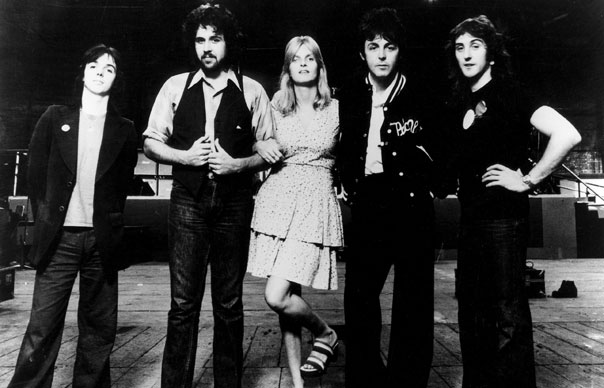In this exclusive interview from Uncut’s June 2007 issue, the Beatles legend recalls his controversial time as leader of Wings. “It was a strange period,” he admits… Interview by David Cavanagh ____________________ March 15, 2007. Soho Square is bathed in buoyant sunshine as a few lunchtim...
Days later it’s announced that the album signals the end of McCartney’s 45-year association with EMI, and will instead be sold in 13,500 Starbucks stores as part of a revolutionary deal signed with the planet’s foremost coffee retailer. “It’s a new world now, and people are thinking of new ways to reach the people,” McCartney’s statement runs. One commentator estimates the album could reach 44 million customers a week. Not bad for a mandolin player with only limited experience.
Wings: the very name carries a pejorative echo in the universal mind. Wings: that FM radio colossus. A precarious rope-ladder from Abbey Road to “Ebony And Ivory”. Wings: a song about a peninsula that stayed at No 1 for a million years. But the Wings story epitomised McCartney in action – his bloody-mindedness, his inner battles between cliché and genius, his loyalty to Linda Mac, his irrepressible gung-ho spirit. And he needed every ounce of that. Wings: the poor saps with the impossible job of following The Beatles.
“I knew it was impossible,” says McCartney straight away. He holds up his hands. “Come on. It’s the impossibility of the universe to follow The Beatles, as all bands ever since have found. Even bands who have almost been successful at it.”
But if Wings are Wings, McCartney is McCartney, a pan-global superstar and billionaire who doesn’t strictly enjoy having his judgment questioned. There’s a physical emphasis to him in person that doesn’t come over on TV, and certain remarks have an unmistakable edge. He dismisses the rock critics (“They come and go”) who sneered at every Wings album except Band On The Run. There are no olive branches for Beatles fans who found Wings maddeningly inconsistent (“That’s too bad, isn’t it? It’s my life”). To McCartney, Wings always made perfect sense.
“It’s like with ‘Mary Had A Little Lamb’,” he scoffs, referring to a much-maligned 1972 single. “People said, ‘Oh, he only put that record out because [“Give Ireland Back To The Irish”] was banned.’ It wasn’t like that. I had a baby. We used to sing the song around the house and I thought it sounded catchy. I probably should have thought, ‘Yes, but is this the record that you want in your portfolio right now? Is it “the move”?’ But I don’t think in terms of ‘moves’.”
Wings were born out of a farmhouse, a marriage, “almost a nervous breakdown” and a pair of sketchy, convalescent solo albums. In 1969 McCartney had grown weary of driving from his St John’s Wood house to Savile Row every day to have the same circular argument with The Beatles about whether the notorious Allen Klein should be their manager, and what percentage of their income he should get. “The others were saying, ‘He’s great.’ And I was saying, ‘No, he isn’t! He’s not great at all, and 20 per cent is too much for someone to take off The Beatles. This is not The Bottles. It’s The Beatles, and it’s a fucking great group, and someone should take 10 per cent, if that.’”
Exhausted and defeated, McCartney withdrew from London for a simpler life – with his American wife Linda and their daughters – at his farmhouse in Argyllshire, near the Mull of Kintyre.
“It was hippie times,” he smiles, “and Linda and I were looking after ourselves, planting vegetables, farming. I was mowing the fields, shearing the sheep and stuff. It was an attempt to return to basics. I felt like I needed to get back to ‘me’. I’d got way too far away from who I was.”
By mid-1970, with McCartney vilified nationally as The Beatles’ executioner, Linda was nursing him through a year-long depression on the farm. She was both rock and collaborator. Having sung a harmony on “Let It Be” (uncredited), she now added her folksy voice to some of Paul’s best early solo work (“Another Day”, “Uncle Albert/Admiral Halsey”), as well as some of his worst. His commercial stock remained high – McCartney topped album charts in America, Ram in Britain – but neither critics nor old friends had kind words for the homespun, hit-or-miss ditties he now favoured. “I don’t think there’s one tune on Ram,” lamented Ringo Starr in 1971.
In bed one night, Paul asked Linda a question. Did she fancy being in a band? “She said, ‘Ooh I don’t know, really,’” he recalls, adopting a Mavis Riley quaver. “I said to her, ‘You have to imagine there’s a curtain there, and we’re behind it, and if it opens up… would you like that? We’d be the band and there’d be an audience out there. Could you get into that?’ She said, ‘Yeah… I think so.’ We took it as lightly as that. Mick Jagger said [scornfully] ‘Why did he get his old lady in the band?’ I wanted to be with her, that’s all.”



